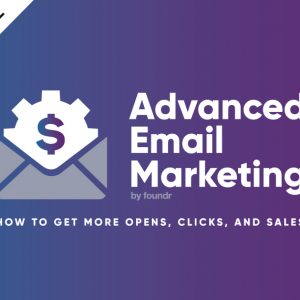[GroupBuy] Google Ads Lab Course – George Clements
$297.00 Original price was: $297.00.$42.00Current price is: $42.00.
The Google Ads Lab Course promises to be a game-changer for eCommerce brands seeking to scale their businesses through effective Google Ads strategies. This comprehensive program, designed by an agency managing significant Google Ads spend, offers a deep dive into their proven methods, SOPs, and scripts. Aimed at eCommerce brand owners, agency professionals, and in-house marketing teams, the course claims to provide the tools and knowledge necessary to achieve profitable growth using Google Ads.
Table of Contents
Decoding the Promise of Profitability and Scalability
The allure of any Google Ads course lies in the promise of tangible results – increased sales, higher ROI, and sustainable growth. The Google Ads Lab Course explicitly targets profitability and scalability, positioning itself as the key to unlocking significant eCommerce potential. It’s an ambitious claim, but one that resonates deeply with businesses constantly seeking a competitive edge in the ever-evolving digital landscape. The headline, “Scale Any Ecommerce Brand Profitably With Google Ads,” is a direct and compelling statement of intent.
The Allure of Profitable Scaling
Achieving profitability while scaling Google Ads campaigns is the holy grail of eCommerce marketing. It’s not just about increasing ad spend; it’s about optimizing every aspect of the campaign to ensure that each dollar spent generates a positive return. This requires a deep understanding of bidding strategies, audience targeting, conversion tracking, and continuous optimization. The course suggests it provides the secret sauce, the “strategies that are working right now,” offering participants a shortcut to success.
Imagine a scenario where an online clothing retailer struggles to break even on their Google Ads campaigns. They are spending money, driving traffic, but not seeing the corresponding increase in sales. This is where the promise of profitable scaling becomes particularly attractive. By implementing the strategies taught in the Google Ads Lab Course, they could potentially transform their campaigns from a drain on resources into a profit-generating engine.
The difficulty lies in actually achieving this. Scalability without profitability is a recipe for disaster. This is why it’s crucial to truly understand the principles taught within the course and apply them strategically to one’s own unique business and target market.
Real-World Strategies vs. Theoretical Concepts
A significant distinguishing factor for any marketing course is the balance between theoretical concepts and practical application. The Google Ads Lab Course seems to be leaning heavily towards the practical side, emphasizing “in-the-trenches” strategies and actionable insights. This approach is particularly appealing to those who prefer learning by doing, rather than getting bogged down in abstract theories.
The agency offering the course claims to derive their knowledge from managing millions in ad spend for numerous eCommerce brands. This real-world experience is positioned as a major selling point, suggesting that the strategies taught are not just theoretical concepts, but rather proven methods that have been tested and refined in the real world. This direct connection to tangible results is a key differentiator in a market saturated with generic marketing advice.
The potential pitfall is that what works for one eCommerce brand might not necessarily work for another. Each business has its own unique challenges and opportunities. Therefore, it’s important to approach the course with a critical eye, adapting the strategies to fit one’s own specific needs and goals.
The Power of Up-to-Date Knowledge
In the fast-paced world of Google Ads, knowledge can quickly become outdated. Algorithms change, new features are released, and consumer behavior evolves. A marketing course that fails to keep pace with these changes risks becoming irrelevant. The Google Ads Lab Course addresses this concern by promising lifetime access and ongoing updates.
This commitment to continuous improvement is a significant value proposition. It suggests that participants will not only gain access to current strategies but will also remain up-to-date with the latest trends and best practices. In a landscape where staying ahead of the curve is essential for success, this ongoing support can be invaluable.
However, the value of these updates depends on their quality and relevance. It’s important to ensure that the updates are not just superficial changes but rather substantive improvements based on real-world testing and analysis. The agency’s promise to “continually update the course month on month with new resources, scripts and lessons” inspires confidence, but the proof will be in the delivery.
Leveraging Agency Expertise and Deep-Pocket Experience
The Google Ads Lab Course is presented as a distillation of the knowledge gained by a top-followed Google Ads agency managing $1.5 million per month profitably for 60+ active eCommerce brands and having acquired knowledge from managing $50 million+ in ad spend. This claim of extensive experience is a cornerstone of their credibility, suggesting that the course is not just based on theoretical knowledge, but on hard-won insights gained from managing significant ad budgets across a diverse range of eCommerce businesses.
Translating Ad Spend to Effective Strategies
Managing millions of dollars in ad spend does not automatically translate to effective strategies. It’s what the agency has learned from that experience – the successes, failures, and the nuances of different campaigns – that truly matters. The Google Ads Lab Course aims to translate this experience into actionable strategies that participants can implement in their own businesses.
The claim of managing $1.5 million per month profitably raises a question: what does “profitably” actually mean? Is it a small margin or a substantial return on investment? The answer to this question is crucial for assessing the true value of the agency’s expertise. Profitable ad management should be defined by specific metrics, such as Return on Ad Spend (ROAS) or Cost Per Acquisition (CPA), allowing potential students to better evaluate suitability of a course to their advertising needs.
The implication is that the course provides a detailed blueprint for achieving similar levels of profitability. However, it’s important to recognize that every eCommerce business is unique, and what works for one might not necessarily work for another. The key is to adapt and customize the strategies to fit one’s own specific needs and goals.
The Value of “In-the-Trenches” Teaching
The course is taught by the agency owner, George Clements, and his highest-ranking account managers. The fact that these instructors are actively involved in managing ad spend on a daily basis is a significant advantage. It means that they are not detached academics or consultants but rather practitioners who are intimately familiar with the challenges and opportunities of the current Google Ads landscape.
This “in-the-trenches” teaching style contrasts sharply with more theoretical or academic approaches to marketing education. The emphasis is on practical, actionable advice that can be implemented immediately. The description of the teaching style as “just me and my team filming some looms and going through accounts” reinforces this focus on practicality over production value.
The potential risk is that this approach may lack the structure and rigor of a more formal educational program. However, for those who prefer a hands-on, results-oriented learning experience, this could be a major draw. The key that will separate a good teaching style from a great teaching style will be the clarity of the explanations, and the relevance of the examples used.
Validating Claims of Expertise Through Testimonials
The excerpts include testimonials from clients who have seen positive results working with the agency, such as increased spend, profitability, and improved account efficiency. These testimonials provide social proof, lending credibility to the agency’s claims of expertise. While it’s impossible to verify the authenticity of these testimonials without further investigation, they offer a glimpse into the potential benefits of the agency’s strategies.
It’s important to view these testimonials with a degree of caution. Testimonials are generally selected to highlight the positive aspects of a product or service. There may be other clients who have not achieved the same level of success, or who have had negative experiences with the agency. The best way to validate the claims of expertise is to research additional sources of information, such as online reviews, case studies, or independent analyses of the agency’s performance.
The testimonials do suggest that the agency has a track record of delivering results for its clients. However, one should consider if the results are sustainable and the time it took to achieve them. Ultimately, the decision to invest in the Google Ads Lab Course should be based on a thorough evaluation of all available information, including the testimonials, the agency’s claims of expertise, and your own specific needs and goals.
Navigating the Comprehensive Google Ads Curriculum
A comprehensive Google Ads curriculum needs to cover the range of topics, from the core principles that underpin all successful campaigns to more advanced strategies that can provide a competitive edge. The Google Ads Lab Course outlines a broad array of modules, including introductory lessons, Google Ads fundamentals, Google Analytics 4, conversion tracking, Google Merchant Center optimization, search campaigns, shopping campaigns, Performance Max, display remarketing, YouTube ads, advanced strategies, and campaign optimization.
Foundational Modules: Building a Strong Base
The introductory lessons and Google Ads fundamentals are crucial components of any comprehensive Google Ads curriculum. These modules lay the foundation for understanding the more advanced strategies and tactics that will be covered later in the course. Without a solid understanding of the basics, participants may struggle to grasp the more complex concepts and techniques.
The inclusion of “5x most important Google ads lessons” within the introductory module suggests that the course prioritizes the most essential concepts. Similarly, the focus on “best account structure” within the Google Ads fundamentals module highlights the importance of organizing campaigns in a way that maximizes efficiency and effectiveness. A well-structured account allows for better tracking, reporting, and optimization.
The success of the course hinges on how effectively these foundational modules are presented. They must be clear, concise, and engaging, providing participants with a solid understanding of the core principles of Google Ads. Without this foundation, the more advanced strategies may not be as effective.
Advanced Modules: Unlocking Competitive Advantage
While the foundational modules are essential for building a strong base, the advanced modules are where the Google Ads Lab Course can truly differentiate itself. These modules cover specialized topics such as Performance Max campaigns, display remarketing, YouTube ads, and advanced optimization strategies. Mastering these advanced techniques can provide a competitive edge and unlock significant growth potential.
The inclusion of a “signature setup and scaling strategy” for Performance Max campaigns suggests that the course provides unique insights and proven methods for leveraging this powerful campaign type. Similarly, the focus on a “unique targeting strategy” for display remarketing and a “YouTube shorts strategy” indicates that the course covers cutting-edge techniques that are not widely known or understood.
The “Labelizer bucketing strategy” and “Feeder strategy” mentioned within the advanced strategies module are particularly intriguing. These proprietary strategies could represent a significant value proposition for participants, providing them with access to techniques that are not available elsewhere. The extent to which these strategies deliver on their promise will be a key determinant of the course’s overall value.
The Importance of Data-Driven Decision Making
The inclusion of Google Analytics 4 (GA4) and conversion tracking modules underscores the importance of data-driven decision-making in Google Ads. GA4 provides a wealth of data about website traffic, user behavior, and conversion rates. By analyzing this data, marketers can gain valuable insights into which campaigns are performing well and which ones need improvement.
Enhanced conversion tracking and consent mode are essential for accurately measuring the effectiveness of Google Ads campaigns in a privacy-conscious world. Enhanced conversion tracking improves the accuracy of conversion data by matching website conversions to Google Ads clicks. Consent mode allows marketers to respect user privacy preferences while still collecting valuable data.
The Google Ads Lab Course’s focus on advanced data analysis techniques highlights its commitment to providing participants with the tools they need to measure, analyze, and optimize their Google Ads campaigns effectively. The success of this course won’t come without carefully scrutinizing the data.
Embracing Practical and Actionable Strategies
The Google Ads Lab Course emphasizes practical, ready-to-implement strategies and resources. It focuses on providing internal agency resources such as a Campaign Optimisation Checklist, an Account Structure Playbook, and an Updated 2025 Strategies Guide. The teaching style prioritizes results over polished production, offering a realistic view of campaign management.
Actionable Resources Over Presentation Polish
In the realm of online courses, the emphasis often tilts towards slick production value—glossy videos, high-end graphics, and perfectly scripted presentations. While aesthetically pleasing, these elements don’t always translate to practical knowledge. The Google Ads Lab Course seems to be consciously steering away from this trend, prioritizing actionable resources over presentation polish.
The mention of internal agency resources, such as a Campaign Optimization Checklist and an Account Structure Playbook, suggests a focus on providing participants with tangible tools that they can use to improve their Google Ads campaigns. These resources could include templates, worksheets, and step-by-step guides that streamline the optimization process. The value of these tools lies in their ability to simplify complex tasks and provide a clear roadmap for success.
The description of the teaching style as “just me and my team filming some looms and going through accounts” reinforces this focus on practicality. The course appears to be aiming for authenticity and transparency, giving participants a behind-the-scenes look at how the agency manages its own Google Ads campaigns. The emphasis is placed on strategies that drive real results, rather than superficial improvements.
Real-World Checklists and Playbooks for Success
The Campaign Optimization Checklist and Account Structure Playbook are particularly valuable resources. A well-designed Campaign Optimization Checklist can help marketers ensure that they are following a consistent and effective optimization process. This checklist can cover a wide range of tasks, from keyword research and bid management to ad copy testing and landing page optimization.
An Account Structure Playbook provides best practices for organizing Google Ads accounts. A well-structured account allows for better tracking, reporting, and optimization. The playbook could include guidelines for creating campaigns, ad groups, and keywords, as well as tips for segmenting audiences and allocating budgets.
The usefulness of these resources depends on their quality and depth. A superficial checklist or playbook may not provide enough guidance to be truly effective. However, a comprehensive and well-researched checklist or playbook can be a valuable tool for improving Google Ads performance.
Staying Ahead with an Updated 2025 Strategies Guide
The inclusion of an Updated 2025 Strategies Guide is a forward-looking element of the Google Ads Lab Course. In the fast-paced world of online advertising, it is essential to stay ahead of the curve. This guide could provide a roadmap for future Google Ads strategies, highlighting emerging trends, new technologies, and best practices.
The guide could cover topics such as the rise of artificial intelligence in advertising, the increasing importance of privacy-focused marketing, and the evolution of Google’s algorithms. It could also provide guidance on how to adapt Google Ads campaigns to the changing needs and expectations of consumers.
The value of the Updated 2025 Strategies Guide depends on its accuracy and relevance. The guide needs to provide actionable insights that participants can use to prepare for the future of Google Ads. While it’s difficult to predict the future with certainty, a well-informed and well-researched guide can provide a valuable framework for planning and strategizing.
The inclusion of these practical resources helps the Google Ads Lab Course stand out, but it is important to ensure that strategies are adapted well to one’s own specific needs and goals of your company during campaign management.
Targeting Audiences and Maximizing Benefits
The Google Ads Lab Course is designed for a diverse audience involved in eCommerce Google Ads, spanning eCommerce brand owners, agency owners/freelancers, and in-house teams/employees. The course offers distinct benefits tailored to each of these groups, aiming to address their specific needs and challenges. This targeted approach suggests a well-thought-out understanding of the different roles and responsibilities within the eCommerce Google Ads ecosystem.
Empowering eCommerce Brand Owners with Knowledge
The primary benefit for eCommerce Brand Owners is the potential to manage their own ads, saving on agency fees. The course materials explicitly state: “Save paying an agency $2,000 to $4,000 per month and learn the skill yourself so you stay in control.” This is a compelling value proposition for brand owners who are looking to reduce costs and gain more control over their marketing efforts.
By learning to manage their own Google Ads campaigns, eCommerce Brand Owners can gain a deeper understanding of their customers, their products, and their overall marketing strategy. They can also respond more quickly to changes in the market and make more informed decisions about their ad spend.
The potential drawback is that managing Google Ads campaigns requires a significant investment of time and effort. Brand owners need to be willing to dedicate the necessary resources to learn the ropes and stay up-to-date with the latest trends and best practices. It should be a long term goal for the company, and not just a one time expenditure.
Elevating Agency Owners and Freelancers with Next-Level Results
For Agency Owners and Freelancers, the Google Ads Lab Course promises to sharpen their service delivery and achieve jaw-dropping results for clients. The statement, “This course gives you A-Z everything you need to know to get your clients jaw dropping results so that they practically raise their own retainers,” is a bold claim that speaks directly to the ambitions of agency professionals.
By mastering the strategies and techniques taught in the course, agency owners and freelancers can enhance their credibility, attract new clients, and increase their profitability. They can also differentiate themselves from competitors by offering specialized services and delivering exceptional results.
Clients are more reliant on agency owners that are on top of their game or can implement the best strategy to optimize for their business in the long term.
Equipping In-House Teams for Career Advancement
In-House Teams and Employees can gain cutting-edge strategies that will practically guarantee that they get a raise. This promise is based on the assumption that improved Google Ads performance will lead to increased revenue and profitability for the company, making the employee a more valuable asset.
By mastering Google Ads, employees can demonstrate their value to the company and increase their chances of career advancement. The course also provides them with the knowledge and skills to stay ahead of the curve and make a meaningful contribution to the company’s success. However, the effectiveness of the learning will depend on the employee’s skill and also their willingness to adapt to new strategies.
Benefits for Different Target Audiences:
| Target Audience | Primary Benefit | Potential Drawback |
|---|---|---|
| eCommerce Brand Owners | Cost savings and increased control | Time and effort required for learning and managing campaigns |
| Agency Owners/Freelancers | Enhanced credibility and profitability | Need to adapt the learnings for your target market. |
| In-House Teams/Employees | Career advancement and increased value to the company | The effectiveness relies on company goals and management. |
Amplifying the Importance of Google Ads in eCommerce
The course strongly advocates for the necessity of Google Ads, stating they capture customers with purchase intent – people actively searching for what you sell. They argue that Google Ads offer higher conversion rates and faster ROI than any other platform, making them essential for complete eCommerce marketing. While this assertion is arguable, it highlights the perceived value of Google Ads as a core component of the eCommerce marketing mix.
Capturing Purchase Intent for Higher Conversions
The key advantage of Google Ads lies in its ability to target customers with purchase intent. Unlike social media advertising, where users are often passively scrolling through their feeds, Google Ads targets users who are actively searching for specific products or services. This “intent-based” targeting leads to higher conversion rates and faster ROI.
Google Ads allows marketers to reach customers who are already in the buying process, increasing the likelihood of making a sale. By targeting specific keywords and phrases, marketers can ensure that their ads are seen by the right people at the right time.
The effectiveness of this approach depends on the quality of the keywords and phrases that are targeted. It is important to conduct thorough keyword research to identify the terms that are most likely to drive conversions.
Accessing Vast Reach Across Search, Shopping, and YouTube
The statement that Google Ads provides access to 90% of internet users across Search, Shopping, and YouTube highlights the platform’s vast reach. Google is the dominant search engine in most parts of the world, and YouTube is the second-largest search engine and that is also owned by Google.
By advertising on Google, marketers can reach a huge audience of potential customers. They can also leverage the platform’s targeting capabilities to reach specific demographics, interests, and behaviors. Access does not guarantee success; effectively targeting, creating compelling ads, and optimizing campaigns are still crucial steps to realize ROI.
Achieving Faster ROI Compared to Other Platforms
The claim that Google Ads delivers faster ROI than any other platform is a significant selling point. While this statement may not be universally true, Google Ads does tend to generate faster results than other marketing channels, such as social media, SEO, or email marketing.
This faster ROI is due to the platform’s ability to target customers with purchase intent and track conversions accurately. By focusing on keywords and phrases that are most likely to drive sales, marketers can quickly identify and scale their most profitable campaigns.
The ROI isn’t guaranteed, which is why the Google Ads Lab Course is in operation, to assist companies to be more efficient and effective while implementing their ad strategy for long term campaigns.
Lifetime Access and Ongoing Updates: A Long-Term Investment
The promise of lifetime access and ongoing updates is a significant value proposition for the Google Ads Lab Course. In the dynamic world of online advertising, strategies and technologies are constantly evolving. A course that provides lifetime access and ongoing updates ensures that participants can stay ahead of the curve and continue to learn and grow over time.
Continuous Learning in a Changing Landscape
The digital marketing landscape is in a constant state of flux. New technologies, platforms, and strategies emerge every year, making it essential for marketers to stay up-to-date with the latest trends and best practices.
A course that provides lifetime access and ongoing updates allows participants to continuously learn and adapt to these changes. They can revisit the course materials as needed, access new content, and participate in ongoing discussions with instructors and other students.
The value of this ongoing learning depends on the quality and relevance of the updates. It is important to ensure that the updates are not just superficial changes but rather substantive improvements based on real-world testing and analysis.
Accessing New Resources, Scripts, and Lessons
The promise to “continually update the course month on month with new resources, scripts and lessons that we learn as we spend millions on this platform” is a strong indication that the course is committed to providing participants with the latest and most effective strategies.
These new resources could include templates, checklists, playbooks, and case studies. The scripts could include code snippets, ad copy examples, and landing page templates. The lessons could cover new topics, provide in-depth analysis of existing strategies, and share real-world examples of success.
The value of these updates depends on the expertise and experience of the course creators. If the course is taught by seasoned professionals who are actively managing Google Ads campaigns, the updates are likely to be valuable and relevant.
Conclusion
In conclusion, the Google Ads Lab Course presents a comprehensive and practical solution for eCommerce brands aiming to scale profitably through Google Ads. Emphasizing real-world strategies derived from extensive agency experience, the course covers fundamental to advanced Google Ads concepts, promising actionable insights and ongoing updates.
While framed as promotional material, the course targets a diverse audience, including brand owners, agency professionals, and in-house teams, offering targeted benefits tailored to each group. Ultimately, the value of the course hinges on the consistent delivery of up-to-date, relevant content that translates into tangible results for its participants.
Sales Page:_https://academy.paidhouse.com/google-ads-lab-course
Delivery time: 12 -24hrs after paid












Reviews
There are no reviews yet.